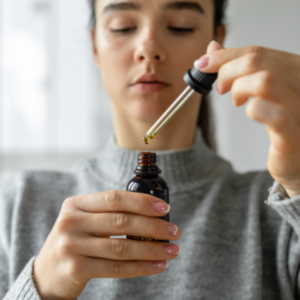
Anxiety can look different for everyone. It can be a difficult and overwhelming experience that can make you feel alone and sometimes even helpless. It’s okay to acknowledge that these feelings are real and that they can impact your daily life. It’s important to remember that you are not alone in your struggles. Many people struggle with anxiety and there are many resources available to help you feel less alone in your journey!
Remember that seeking help for your anxiety is a positive step towards healing. There are therapists, support groups, online resources and endless self-help techniques that can help you feel more grounded and in control. Completely ridding of anxiety is a stretch, but at least everyone has the ability to manage their anxiety so it does not rule their day-to-day life.
It’s okay to ask for help and there is no shame in admitting that you may need support. You deserve to work towards a life filled with peace, joy and fulfilment. It is totally possible to get there with the right tools and support.
In this article we will be taking a closer look at anxiety and some self-help methods you can try out to help you manage your symptoms better. The best thing to keep in mind during your journey is that there is hope and you are not alone!
What is anxiety?
Anxiety is a completely normal human emotion characterized by feelings of fear, worry and unease. These feelings can be physical and/or mental. However, when this condition becomes excessive, persistent and interferes with daily activities, it may be diagnosed as a mental health disorder called anxiety disorder.
Anxiety disorder can manifest in various forms such as generalized anxiety disorder, panic disorder, phobias and social anxiety disorder. Symptoms of anxiety disorder can manifest into excessive worrying, restlessness, irritability, difficulty concentrating, fatigue, muscle tension and much more. Treatment options for anxiety disorder typically include therapy, medications and lifestyle changes such as regular exercise and stress management techniques. Start small and work your way up… Baby steps!
How to reduce anxiety
hopeless about your anxiety can be incredibly overwhelming. However, there are steps you can take to feel more in control. Try reaching out to a mental health professional who can guide you through coping mechanisms, therapy and medication if needed. Practice self-care, mindfulness and relaxation techniques such as deep breathing, meditation and/or yoga. Surround yourself with supportive family and friends. Remember that recovery is possible and you are not alone in this! Seek out resources and support, and never hesitate to ask for help.
It can also be helpful to identify triggers for anxiety and develop coping mechanisms to manage them. Some include but are not limited to; creating a calming ritual, practising positive self-talk, or distracting oneself with a healthy hobby or activity. It is important to prioritize self-care and seek professional help if anxiety is impacting daily functioning to a debilitating degree.
While getting professional help can be an extremely effective way to deal with anxiety, here are some ways you can manage your symptoms when you are not around a mental health care professional.
Practice deep breathing exercises.
Deep breathing exercises help with anxiety by activating the body’s natural relaxation response. When we’re anxious, our body goes into “fight or flight” mode, causing our heart rate to increase and our breathing to become shallow. While this has been a helpful evolutionary development that has helped us survive, it can activate when it isn’t necessary. Deep breathing exercises counteract this by slowing down the heart rate and bringing more oxygen to the body, regulating the nervous system and reducing feelings of anxiety and stress. Practising deep breathing regularly can also increase overall mindfulness and awareness, providing tools to manage anxiety in the future. If you are unsure of where to start, try 3-5 minutes of ‘‘box breathing’’ the next time you feel out of control and see what happens!
Try meditation or mindfulness techniques.
Meditation has been shown to be an effective tool to manage anxiety by reducing the levels of stress hormones in the body. It helps to focus the mind and calm racing thoughts, ultimately promoting a sense of relaxation and inner peace. By practising meditation regularly, individuals can learn to observe their anxious thoughts without getting caught up in them, leading to a reduction in anxiety symptoms. This takes a lot of time, but it is so worth it in the end. Studies have also shown that meditation can increase the grey matter in certain areas of the brain associated with emotional regulation and attention, further improving the ability to manage anxiety.
Cut back on caffeine and sugar.
Cutting back on sugar and caffeine can help with anxiety by reducing the amount of stimulation that your body receives. Both sugar and caffeine can cause your body to produce adrenaline, which can lead to feelings of anxiety, nervousness, or unwanted and unhelpful jitters. By reducing your intake of these substances, you can lower your overall stress levels and feel more calm and relaxed. Additionally, sugar and caffeine can disrupt your sleep, which can worsen anxiety symptoms. By cutting back on these substances, you may be able to improve the quality of your sleep and reduce your anxiety as a result.
Write down worries and create a plan to handle them.
Journaling is known to help with anxiety as it provides an outlet for organizing emotions and thoughts that may feel overwhelming. Writing down worries and concerns can provide a sense of relief and make them feel more manageable. Additionally, journaling can help identify patterns and triggers, providing insight into ways to manage anxiety and helping you move forward in your journey. It can also help cultivate mindfulness and gratitude as individuals reflect on positive experiences and things they’re grateful for. Overall, journaling can be a helpful tool in managing anxiety and promoting overall mental wellness.
Engage in activities that bring joy.
Engaging in activities that bring joy can help reduce anxiety by promoting feelings of happiness and relaxation. When we partake in activities that we enjoy, our bodies release endorphins, which are natural mood boosters that can decrease stress levels. Additionally, these activities provide a distraction from anxious thoughts and can help individuals shift their focus away from their worries. By consistently engaging in joyful activities, individuals can establish healthy coping mechanisms for managing anxiety and develop a more positive outlook on life. Brownies points if the activities you are engaging in involve movement… AKA the ultimate healer.
Take helpful supplements for the mind and body.
CBD, lions mane mushroom and ashwagandha are known for their properties that can help reduce anxiety. CBD interacts with the receptors in our endocannabinoid system, which helps regulate mood and emotions. Additionally, CBD reduces inflammation in the body, which can lead to less physical stress. Lions mane mushroom is shown to positively impact the nervous system, enhancing cognitive function and mood. Finally, ashwagandha reduces cortisol (the stress hormone) levels in the body, providing a calming effect. When taken together, these supplements can work synergistically to help manage anxiety symptoms.
Final Thoughts
Remember, your anxiety is not a sign of weakness. It is simply a part of being human. You are not alone in this journey. There are countless individuals, just like you, who are working towards a life free of anxiety. It may be a long and difficult road but with the right tools and support, it is entirely possible to overcome your anxiety and find peace within yourself.
Never forget that you are worthy of love, happiness and a life free of anxiety. If you are struggling and feel that you need support, don’t be afraid to seek help from trusted sources and others who have your well-being in mind. Whether it’s talking to friends or family, seeking professional help or experimenting with different self-care practices, there is always a way forward.
The most important thing is to keep putting one foot in front of the other and to have faith that you will get through this. You are stronger than you realize.
With time and patience, you can overcome your anxiety.





